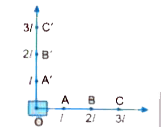The magnitude of the electric field within a conducting wire depends on which of the following quantities?
Potential difference, wire diameter, wire length, and wire conductivity
Potential ditorence and wire conductivity only
Potential difference, wire length, and wire conductivity only
Wire diameter, wire length, and wire conductivity only
The correct Answer is:C
To determine the magnitude of the electric field within a conducting wire, we can follow these steps:
Step 1: Understand the Formula for Electric Field
The electric field (E) can be expressed using the formula:
E=VL
where V is the potential difference across the wire and L is the length of the wire.
Step 2: Identify the Factors Affecting Electric Field
From the formula, we can see that the electric field depends on:
1. Potential Difference (V): The voltage applied across the wire.
2. Length of the Wire (L): The distance over which the potential difference is applied.
Step 3: Consider Conductivity
In addition to potential difference and length, the conductivity of the wire also plays a role. Conductivity affects how easily charges can move through the wire, which in turn influences the electric field. A more conductive wire will allow a higher electric field for the same potential difference and length.
Step 4: Summarize the Dependencies
Thus, the magnitude of the electric field within a conducting wire depends on:
- The potential difference (V)
- The length of the wire (L)
- The conductivity of the wire (σ)
Conclusion
Therefore, the correct answer is that the electric field within a conducting wire depends on the potential difference, the length of the wire, and the conductivity of the wire.
The electric field (E) can be expressed using the formula:
E=VL
where V is the potential difference across the wire and L is the length of the wire.
From the formula, we can see that the electric field depends on:
1. Potential Difference (V): The voltage applied across the wire.
2. Length of the Wire (L): The distance over which the potential difference is applied.
In addition to potential difference and length, the conductivity of the wire also plays a role. Conductivity affects how easily charges can move through the wire, which in turn influences the electric field. A more conductive wire will allow a higher electric field for the same potential difference and length.
Thus, the magnitude of the electric field within a conducting wire depends on:
- The potential difference (V)
- The length of the wire (L)
- The conductivity of the wire (σ)
Therefore, the correct answer is that the electric field within a conducting wire depends on the potential difference, the length of the wire, and the conductivity of the wire.
Topper's Solved these Questions
- CURRENT AND RESISTANCEBOOK - RESNICK AND HALLIDAYCHAPTER - CURRENT AND RESISTANCEEXERCISE - Practice Questions (Linked Comprehension)
5 Videos
- CURRENT AND RESISTANCEBOOK - RESNICK AND HALLIDAYCHAPTER - CURRENT AND RESISTANCEEXERCISE - Practice Questions (Matrix-Match)
9 Videos
- CURRENT AND RESISTANCEBOOK - RESNICK AND HALLIDAYCHAPTER - CURRENT AND RESISTANCEEXERCISE - Problems
36 Videos
- CIRCULAR MOTIONBOOK - RESNICK AND HALLIDAYCHAPTER - CIRCULAR MOTIONEXERCISE - CHECK POINTS
6 Videos
- ELASTICITYBOOK - RESNICK AND HALLIDAYCHAPTER - ELASTICITYEXERCISE - PRACTICE QUESTIONS (Integer Type)
3 Videos
Similar Questions
Knowledge Check
The specific resistance of a conducting wire depends upon
Alength of the wire, area of cross-section of the wire and material of the wireBlength of the wire and area of cross-section of the wire but not on thematerial of the wireCmaterial of the wire only but neither on the length of the wire nor on the area of cross-section of the wireDlength of the wire only but neither on the area of cross-section of the wire nor on the material of the wireLet V be electric potential and E the magnitude of the electric field. At a given position, which of the statement is true ?
AE is always zero where V is zeroBV is always zero where E is zeroCE can be zero where V is non zeroDE is always nonzero where V is nonzeroThe electric conduction of a salt solution in water depends on the :
Asize of its moleculesBshape of its moleculesCsize of solvent moleculesDextent of its ionization
The following data was obtained for the dependence of the magnitude of the electric field, with distance,form a refernce point O, within the chargedistribution in the shaded region figure.


(i) Identify the charge distribution and justify your answer.
(ii) If the potential due to this charge distribution, has a value V at the point A, what is its value at the point A'?
View SolutionThe electric field at a point in space in equal in magnitude to the
View SolutionWhich of the following conducts electricity ?
View SolutionThe electric field inside a perfectly conducting hollow object is
View SolutionImagine a short doiploe at the center of a spherical surface. If the magnitude of the electric field at a certain point on the surface of he sphere is 10NC_1 then which of the following cannot be the magnitude of the electric field anywhere on the surface of the sphere?
View Solution
